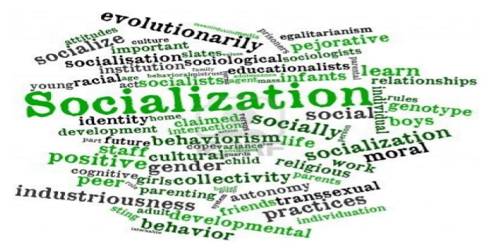Socialization is known as the process of inducting the individual into the social world. It is the process through which a person, from birth through death, is taught the norms, customs, values, and roles of the society in which they live It is the means by which human infants begin to acquire the skills necessary to perform as functioning members of their society. The term socialization refers to the process of interaction through which the growing individual learns the habits, attitudes, values, and beliefs of the social group into which he has been born.
Characteristics or Features of Socialization
The following are some the important features/ characteristic of Socialization –
It takes place formally and informally
Formal socialization takes through direct instruction and education in schools and colleges. The family is, however, the primary and the most influential source of education. Children learn their language, customs, norms and values in the family.
Socialization is a continuous and gradual, rather than a salutatory process
Socialization is a life-long process. It does not cease when a child becomes an adult. In nature, we find that every species or organism follows a pattern of socialization. The same is the case with human beings. Socialization occurs in an orderly manner and follows a certain sequence which, in general, is the same for most children. The rate and speed of development may vary in individual cases.
Socialization involves change-
The human being is never static. From the moment of conception to the time of death, the person is undergoing changes. Nature shapes most clearly Socialization through genetic programming that may determine whole sequences of later. It refers to a Socialization progressive series of orderly coherent changes.
Socialization is often predictable-
Psychologists have observed that each phase has certain Socialization common traits and characteristics. We have seen that the rate of for each child Socialization is fairly constant. The consequence is that it is possible for us to predict at an early age the range within which the child is likely to fall.
It is unique-
Each child is a unique individual. No two children can be expected to behave or develop in an identical manner although they are of the same age. For example, in the same class, a child who comes from a deprived environment cannot be expected to do as well in studies as a child of the same ability whose parents put a high value on education and encourage the child to study.
It is an individualized process:
These individual differences arise because each child is controlled by a unique combination of hereditary endowment and environmental factors. All children, therefore, do not reach the same point of at the same Socialization age.
Information Source:
















